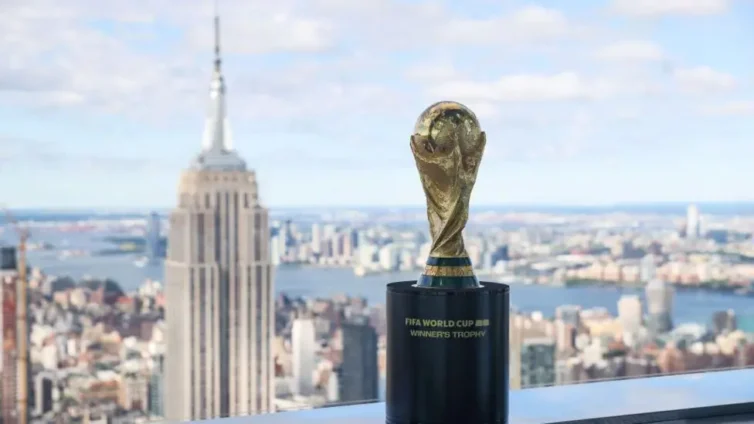European teams will discover their 2026 World Cup qualifying opponents in Friday’s draw, which will be held at 11:00 GMT in Zurich.
A total of 16 Uefa teams will qualify for the expanded 48-team tournament to be held in the United States, Canada and Mexico.
So how does it work – and who could the home nations face?
How does World Cup qualifying work?
The format for European qualifying has changed, with more groups – and smaller ones than before.
There will be 12 World Cup qualifying groups. Six will have four teams and six will have five teams.
Teams will play each other home and away as usual.
The top team from each group qualifies automatically for the World Cup, with the runners-up going into the play-offs with four Nations League teams.
Four of the 16 play-off teams will qualify for the tournament.
Who is seeded?
All of the groups will contain one team each from pots one to four. Six of the groups will also have a team from pot five. There are some restrictions on which teams can be drawn in which groups, and who they can face - more on that below.
The teams will be drawn in order of pots - so pot one teams first, then pot two and so on.
Pot 1: Spain, Germany, Portugal, France, Italy, Netherlands, Denmark, Croatia, ENGLAND, Belgium, Switzerland, Austria
Pot 2: Ukraine, Sweden, Turkey, WALES, Hungary, Serbia, Poland, Greece, Romania, Slovakia, Czech Republic, Norway
Pot 3: SCOTLAND, Slovenia, Republic of Ireland, Albania, North Macedonia, Georgia, Finland, Iceland, NORTHERN IRELAND, Montenegro, Bosnia-Herzegovina, Israel
Pot 4: Bulgaria, Luxembourg, Kosovo, Belarus, Armenia, Kazakhstan, Azerbaijan, Estonia, Cyprus, Faroe Islands, Latvia, Lithuania
Pot 5: Moldova, Malta, Andorra, Gibraltar, Liechtenstein, San Marino
Who will go into a four-team group?
The four teams who win the Nations League quarter-finals in March must each go into one of the four-team World Cup qualifying groups (Groups A-F).
That is because the Nations League finals are played in June, leaving less room in the calendar for World Cup qualifiers.
Because this draw takes place before those games, the quarter-finalists will be drawn as placeholders. For example, the winner of France v Croatia will go in one group, with the loser going in another.
A maximum of one losing Nations League quarter-finalist or one Nations League promotion-relegation play-off team can go in one group.
Scotland and the Republic of Ireland are among the 16 teams in those play-offs - so are more than likely to end in a four-team group.
England are likely to be in a five-team group.
The bottom six seeded teams will automatically go into Groups G-L.
Are there any other restrictions?
For political reasons, Ukraine and Belarus cannot be in the same group, and neither can Gibraltar and Spain. Kosovo must be kept apart from Serbia and Bosnia-Herzegovina.
Weather is a factor too. Because of the potential cold conditions, a maximum of two of Estonia, the Faroe Islands, Finland, Iceland, Latvia, Lithuania and Norway can be drawn together. Iceland and the Faroes cannot be drawn together as they are considered the two countries most at risk of weather disruptions.
There are also geographical limits on who Kazakhstan, Azerbaijan and Iceland can face to avoid too many trips to the opposite side of Europe.
When are the games?
The games will be held over 10 matchdays during five international breaks.
Those international breaks are 21-25 March, 6-10 June, 4-9 September, 9-14 October and 13-18 November.
However no team will play World Cup qualifiers on all of those dates because there is a maximum of eight games.
Some teams will start in March, others will start in June and four-team groups will not start until September.
The play-offs will be 26-31 March 2026.
When is the World Cup?
The World Cup will start on 11 June in Mexico City and end on 19 July in New Jersey.
The expanded 48-team tournament will last a record 39 days.
The new format will feature 12 four-team groups and a last-32 knockout round for the first time.
Latest Stories
-
Today’s Front pages: Friday, May 23, 2025
17 minutes -
Trade Minister urges local sourcing for AfCFTA benefits
55 minutes -
GFA ends media rights negotiations with StarTimes, pursues outstanding debt
1 hour -
Agile working in Ghana– hype or game changer?
1 hour -
Azamati clocks 9.98s to secure Tokyo 2025 World Championships spot
2 hours -
Ghana’s public debt slightly reached $49.5bn by March 2025
2 hours -
BoG modernises monetary policy approach
2 hours -
‘Doctors say you’re 20 years younger, but go easy’ – Mahama to Opoku-Agyemang
3 hours -
Denmark to raise retirement age to highest in Europe
3 hours -
Agape Arts Production rolls out Ghana’s maiden mobile theatre with Kelewele Junction
3 hours -
Dr Seidu Jasaw delivers keynote at launch of Ghana Chapter of COFAAA
3 hours -
Presidential jet unfit for use; undergoing 3-month ‘therapy’ – Omane Boamah confirms
3 hours -
Akufo-Addo’s gov’t rundown presidential jet; its fuel tank is even corroded – Omane Boamah
3 hours -
Sum 41 music agent among those killed in San Diego plane crash
3 hours -
US House passes Trump’s ‘big, beautiful’ tax and spending bill
4 hours

